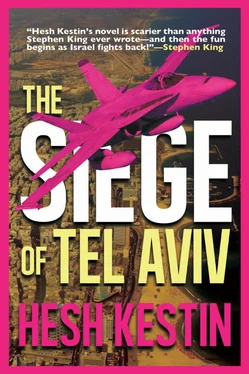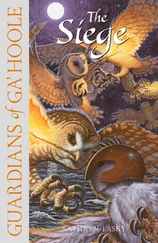“Damian, this line of naked men must be a mile long,” Blunt reports from the ridge. “Clearly the Israelis mean this to be a humiliating lesson to the enemy, whose combined armies only two days ago had Israel on its knees. As you can see, or can’t see because FCC standards and good taste prevent us from shooting up close, if you look at the faces of these prisoners you may be seeing the end of Islamic dreams to destroy the State of Israel. However, Iran, which military sources here call the instigating and organizing force behind the attack, seems to have gotten off scot—”
“Connie, sorry to interrupt, and please stay with us as we break away for startling footage, just in, of developments in Iran, where the oil port of Bandar Abbas has become one enormous fireball. Other reports describe nuclear-like explosions in remote—”
IN THE PRESIDENTIAL BEDROOM at Camp David, the president clicks off the television. He has already been apprised of the situation in Iran. All in all, this night has left him at once frustrated and gratified. He had hoped that the first lady might be inclined to emulate Holly Mawn in the previous evening’s film, but she dozed off in the Camp David screening room just before the crucial, uncut scene. This accounts for his frustration. His gratification is less personal.
“At least,” he says to no one in particular, “it wasn’t us that did it.”
The first lady stirs softly in her sleep. Maybe, the president thinks, looking at her, the night can be win-win after all.
BECAUSE REPAIRS TO THE prime minister’s residence in Jerusalem are not considered a priority in a capital where entire ministries must be rebuilt from the ground up, Yigal chooses to remain at the villa in Herzlia and commute to Jerusalem. In truth, he does not wish to live where his predecessor died, especially after her mutilated body was discovered in the Jerusalem city dump. Besides, his home suits him, and Judy, and Cobi. His son has just taken off on his motorcycle for some sort of party at the same beach that so recently was a slum on its way to becoming a graveyard. If anything, Yigal is aware how slim is the line between vibrancy and rot, hope and despair, attending the funeral and being the corpse. Yigal Lev is determined Israel will not be the corpse.
The phone rings.
Judy looks in. “Good luck,” she whispers. Then shuts the door.
“Good day, Mr. President,” Yigal says into the phone.
“And a good evening to you, Mr. Prime Minister. Yogi—may I call you Yogi?” A pause. “Yi-gal, of course. My Hebrew’s a bit rusty. Barely made it through Spanish in high school. I’ll tell ya, every time I stand up to say something to a group of Messicans I’m thinking, ‘Dear Lord, help me not to say fuck instead of luck .’”
When this is greeted by silence, the president merely continues: not everyone has a good sense of humor.
“Yi-gal. Bible name, is it?”
IN THE LIBYAN DESERT two hundred miles southeast of Benghazi, a truck marked BP driven by an oilfield foreman bearing a striking resemblance to Col. Lior churns through the sand until it comes to a second BP truck with drilling equipment attached. On the horizon, hundreds of derricks pump like nodding birds. After men in yellow BP coveralls unload a heavy black cylinder, three feet long and a foot thick, gently setting it into a drill hole, a technician screws a long antenna into the top of the all but buried cylinder. Others gently cover the antenna with sand.
“IT MEANS GOD WILL redeem, Mr. President.”
“Well, if you don’t mind me saying so, Yi-gal, your God didn’t bring much redemption to them Eyeranians.”
“Mr. President, may I call you Dwayne?”
“Wouldn’t have it no other way.”
“Dwayne, yours didn’t bring much redemption to the Japanese.” Another pause. The president was briefed, but not enough is known about the Israeli prime minister for a proper assessment. Central Intelligence was reduced to interviewing business associates and rivals. Apparently the man is a straight shooter, but not easy.
“Yigal, let’s look ahead instead of back. I’m gonna lay it on the line. The world would feel a lot better if Israel cut back its nuclear arsenal.”
“In the spirit of peace, as it were,” Yigal says. It is a good thing the president cannot see his face.
“Point taken. But you and I know there’s no reason you need so many nukes. Can’t we reduce that a bit, for the sake of safety and easing tensions? Frankly, I’m looking at a close election. By golly, you are too.”
FROM AN UNPAVED ROAD twisting through wasteland, a convoy of US Army Humvees descends onto an even rougher track ending at a metal gate marked in Arabic and English:
Halliburton Iraq
NO ENTRY
The US Army major in the first Humvee dismounts, unlocks the gate and swings it open. In the light of the Humvee’s headlights and despite the unfamiliar uniform, he looks very much like the Israeli gangster and sometime chief of police Misha Shulman.
Eventually the convoy comes to a lone tent over which a US flag snaps in the wind. The tent is guarded by Hebrew-speaking soldiers in US Army uniforms, who salute, then part the tent flaps to reveal what appears to be a grave, shovels still in the ground. Speaking in Hebrew, the US Army major orders a black metal cylinder, about three feet long and a foot thick, brought into the tent and placed gently in the grave.
“EXACTLY, DWAYNE,” YIGAL SAYS. “I agree. We should do something about our nuclear arsenal. And if it will help you at the polls, how can I say no?”
Now the pause is longer. “Well, sir, I’d hoped for your cooperation, but I didn’t expect it to be this easy. You people got a reputation for driving a hard bargain, am I right?”
At this point both sides are pleased the conversation is limited to voice, the president because he is surrounded by advisors, the prime minister because he is alone—with others in the government present, there would of necessity be a record of the conversation, and even released after the statutory thirty years this might cause problems.
“Naturally Israel must be compensated for the destruction caused by this war, not least because American weaponry was used against us. And the United States did wait a very long time before delivering humanitarian aid.” Yigal stage-coughs. “We do have a shopping list, mostly military.”
The president mouths the word silently to Felix St. George: Jews . “Yogi, I’m sure we can work something out. How about we make a joint statement here in Washington to announce this reduction plan—”
“Dwayne, there may be some misunderstanding here.”
But the president, buoyed by the prospect of electoral victory, is moving right along. “I’m thinking late October. Howzat? Leaves time for your folks and my folks—”
IN THE SAUDI DESERT, a camel caravan moves past a forest of oil rigs to a small oasis, where armed Bedouin sit around a fire. The two groups greet each other formally before the caravan leader, who is in fact a Bedouin, though not local, is taken to a pile of rocks arranged in a rough pyramid, a traditional marker. A heavy black cylinder, three feet long and a foot thick, is unloaded from one of the camels. The Bedouin leader watches it being buried beneath the rocks. IDF Staff Sgt. Abed Abu-Kassem of the Ghawarna, a small clan in the north of Israel, smiles broadly. He has waited this long to fuck the enemy in the rear, and properly.
Читать дальше












